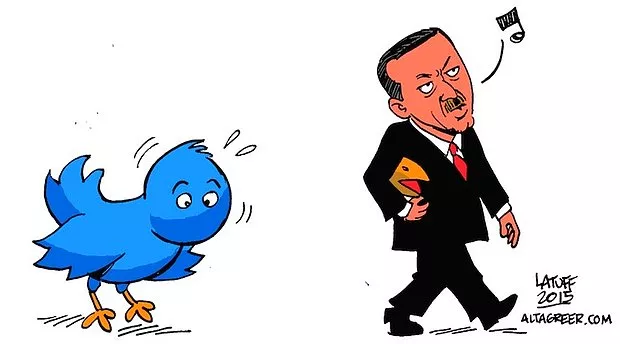Levent Kenez/Stockholm
President Recep Tayyip Erdoğan’s government plans to increase its control over news websites and social media with new legislation. While a draft bill submitted to parliament states that it is aimed at combatting disinformation, extensive censorship is also introduced regarding the operations of the Turkish intelligence agency (MİT).
The opposition is worried that the Erdoğan-controlled courts will decide what is disinformation and what is fake news. It is no secret that the Erdoğan government, which controls almost all of the Turkish media, is unhappy with critical content, especially that published abroad, on social media. The new legislation is part of efforts to build a legal mechanism that censors critical posts and videos before the elections in 2023.
The bill drafted by the ruling Justice and Development Party (AKP) and its partner, the far-right Nationalist Movement Party (MHP), was approved by the relevant parliamentary committee yesterday. The committee meetings, which started at 14:30 on Wednesday, ended at 04:25 on Thursday morning. It is expected to be submitted to the parliament floor for debate in the coming days. The completion of the committee meeting without a break shows that the government aims to put the law into effect as soon as possible. A majority of the new laws proposed in the bill are planned to be implemented as soon as the president signs the legislation, the rest as of January 1, 2023. Some observers feel this is a sign of a possible early election.
Text of the bill obtained by Nordic Monitor:
With the new articles being added to the Turkish Penal Code, the crime of “publicly disseminating misleading information” is defined for the first time. A person who spreads disinformation is defined as “a person who publicly disseminates false information about the internal and external security, public order and general health of the country, in a way that is suitable for disturbing the public peace, with the sole aim of creating anxiety, fear or panic among the public. Those who commit this crime will be sentenced to imprisonment of between one and three years. If the accused hides it or commits it within the framework of terrorist organization activity, the penalty will be increased by half.”
Within the scope of the obligation for foreign social media platforms to have a representative, it will no longer be sufficient for the representative to be a Turkish citizen only; the representative will need to reside in Turkey. If the daily access from Turkey is more than 10 million, the legal representative is supposed to be fully authorized and responsible for technical, administrative, legal, and financial issues before the law.
With the new legislation, the distinction between the commission of the crime in Turkey and abroad has been removed in order to more effectively combat offenses that require arrest.
Meanwhile, the draft bill stipulates that grounds for arrest are deemed to have occurred for the suspects who produce criminal content regarding the activities and personnel of MİT. The content is not defined.
Internet news websites will also be included within the scope of the Press Law and will be defined as periodicals. Employees of these media organizations will also be able to obtain press cards. In the committee meeting, opposition lawmakers stated that the government had implemented a carrot and stick strategy, adding that among the new advantageous articles for journalists, those with the intention of censorship have also been added.
Having a press card in Turkey is necessary to follow official meetings and to be accredited to state organizations. The press card also allows free use of public transport in some cities and free parking.
In the new proposal, news websites will also have to submit published content to a chief public prosecutor’s office if so requested.
Last December, Erdoğan gave hints of legislation to criminalize spreading fake news and disinformation online, describing social media as one of the main threats to democracy.
“Social media, which was described as a symbol of freedom when it first appeared, has turned into one of the main sources of threat to today’s democracy,” Erdoğan said in a video message to a government-organized communications conference in İstanbul. “We try to protect our people, especially the vulnerable segments of our society, against lies and disinformation without violating our citizens’ right to receive accurate and impartial information.”
Turkey passed a law in 2020 requiring social media platforms that have more than 1 million users to maintain a legal representative and store data in the country. Major social media companies, including Facebook, YouTube and Twitter, have since established offices in Turkey.
Most of Turkey’s major media companies are under the control of the government, leaving social media as an important outlet for dissenting voices.












